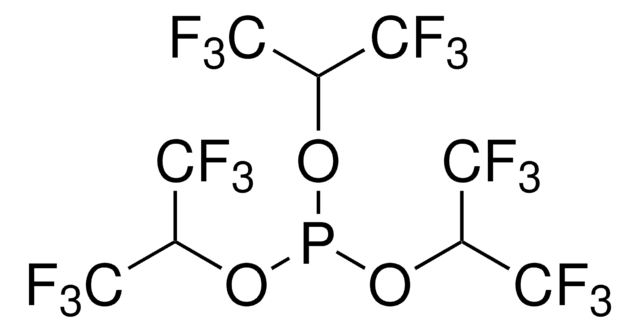464309
Methoxyperfluorobutane
99%, mixture of n- and iso-butyl isomers
Synonym(s):
Nonafluorobutyl methyl ether, HFE-7100, Methoxynonafluorobutane, Methoxyperfluorobutane, Nonafluoromethoxybutane
About This Item
Recommended Products
Assay
99%
refractive index
n20/D 1.3 (lit.)
bp
60 °C (lit.)
mp
−135 °C (lit.)
density
1.52 g/mL at 25 °C (lit.)
SMILES string
COC(F)(F)C(F)(F)C(F)(F)C(F)(F)F.COC(F)(F)C(F)(C(F)(F)F)C(F)(F)F
InChI
1S/2C5H3F9O/c1-15-5(13,14)3(8,9)2(6,7)4(10,11)12;1-15-5(13,14)2(6,3(7,8)9)4(10,11)12/h2*1H3
InChI key
OKIYQFLILPKULA-UHFFFAOYSA-N
Looking for similar products? Visit Product Comparison Guide
Application
- In the synthesis of various aryl fluoride derivatives via electrophilic fluorination of aryl and heteroaryl Grignard reagents.
- In grafting of fluorinated diblock copolymers onto silica particles.
Storage Class Code
10 - Combustible liquids
WGK
WGK 3
Flash Point(F)
Not applicable
Flash Point(C)
Not applicable
Certificates of Analysis (COA)
Search for Certificates of Analysis (COA) by entering the products Lot/Batch Number. Lot and Batch Numbers can be found on a product’s label following the words ‘Lot’ or ‘Batch’.
Already Own This Product?
Find documentation for the products that you have recently purchased in the Document Library.
Customers Also Viewed
Our team of scientists has experience in all areas of research including Life Science, Material Science, Chemical Synthesis, Chromatography, Analytical and many others.
Contact Technical Service













